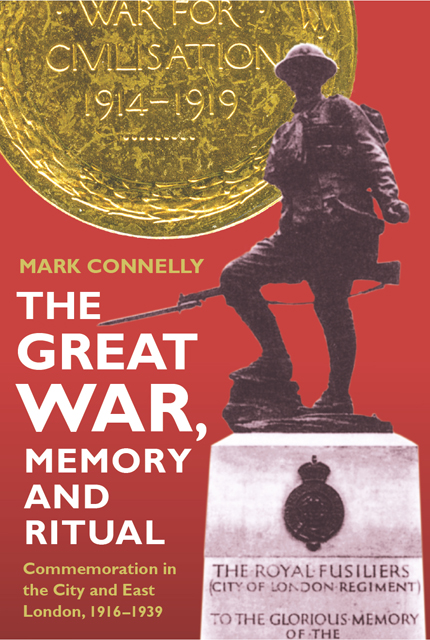4 - The Alternative Bonds of Community: War Memorials in Places of Work, Schools, Colleges and Clubs
Published online by Cambridge University Press: 22 March 2023
Summary
Although the bonds of residence and religion were clearly important in defining identity and community, they were not the only forms of belonging. Work and the workplace was (and still is) a vital institution in which certain codes and beliefs were promoted and held in common. Walter Besant put it into the specific geographical context of this study: 'East London is, to repeat, essentially and above all things a city of the working-man.' More recently, the sociologists Willmott and Young studied attitudes to work in London and stated that
Whether or not labour is, in Marx's term, 'a commodity', it is a link with the collective life. Work also creates a time-ordering of the sort that is necessary not only to social structure. Routines in the way people organize their lives are indispensable to almost everyone.
Work provided an extended family and the paternalist nature of some of the East London firms such as the Thames Ironworks and the Gas Light and Coke Company meant that a great deal of pride was felt in their shared achievements and endeavours.
Schools, youth clubs and colleges were equally important elements in forming bonds of identity and belonging. As 'rolling communities' constantly taking in and losing members, the values each institution enshrined were the only fixed points of reference and provided the framework and continuity needed to give them stature and influence. The young were exposed to all sorts of influences in these institutions, shaping them into patriotic, Christian and comformist citizens willing to do their bit for God, King and Country in 1914. The City and East London contained a great cross-section of schools ranging from those of the City Guild Companies to the London County Council elementary schools of Poplar and Stepney. Muscular Chris tianity, a code of honour, chivalry and self-sacrifice, pervaded these institu- tions regardless of status. The 'lesser' schools always sought to ape the value systems of their 'superiors': schools like East Ham Technical College and Secondary School readily adopted the Officer Training Corps as a way of instilling such values.
The workplace
The influence of a workplace over its community can be seen in the Gas Light and Coke Company works at Beckton. Beckton was a community almost entirely dominated by this one great employer.
- Type
- Chapter
- Information
- The Great War, Memory and RitualCommemoration in the City and East London, 1916-1939, pp. 75 - 97Publisher: Boydell & BrewerPrint publication year: 2001

